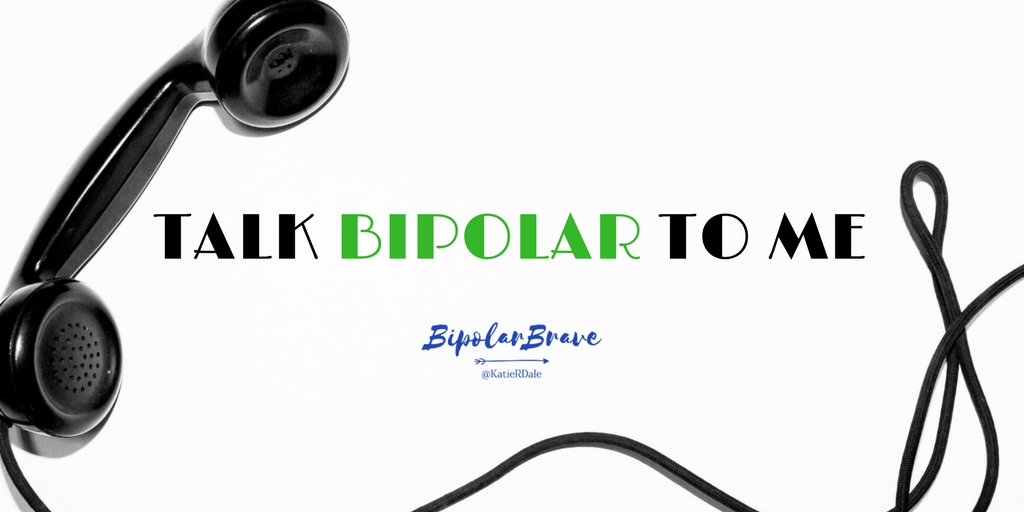Getting Nowhere Fast
Does communicating with your loved one tend to feel as though they won’t open up? Or, perhaps, they’re going too fast for you to keep up with. Maybe they’re dominating the conversation and you can’t get a word in edgewise. In any of these situations it can be frustrating to try to hold a conversation, especially if they’re stonewalling and you can’t seem to get them to open up.
Within this series are a few ideas from one who’s been there, and done that – and in most cases, what works, and what doesn’t. Each week I’ll feature a part of a mental illness and give you suggestions for how to interact with someone in that frame of mind. So be sure to come back in the following weeks for more pointers and tips to continue to educate yourself and loved ones with mental illness, and learn how to Talk Bipolar To Me.
Talking With A Manic Bipolar
Today I’m focusing on the bipolar mania. The typical symptoms accompanying this state of mind are fast and enthusiastic. Someone in mania will likely speak quickly, say a lot, and not always make sense.
- Listen first.What is the big idea we’re trying to communicate? To pull it out, stoke our thoughts a little. Understand though, a little bit of questioning can go a long way – in this state we love to talk and embellish our language with as big in in our vocabulary as our rate of words per minute. If we aren’t making sense, try asking clarifying questions, but like I said, in moderation. Someone in this state just wants to be acknowledged, heard and agreed with. Which, by the way, does not always mean you agree with what we’re saying, but you agree to the degree that you can empathize with us and at least imagine where we’re coming from. Validation is key and means the world to us in what my family calls “La La Land.”
- Stay true and faithful.Yes, being around a full-fledged manic can be extremely taxing on everyone’s nerves, including the one with the bipolar. I get it, we take up a lot of energy, time and emotions – resources that the average person cannot keep up themselves. So when you’re done listening and you can’t seem to give us the right answer, it’s okay. Just ensure you’re there for us, and when you’re available you will be supportive of our needs, whether that means getting us a ride to the hospital, helping us make a doctor’s appointment, keeping us accountable in seeing their therapist, or just to communicate that you care about our wellbeing and want us well. It really means the difference between acquaintances and friends, but a true friend will understand, and if you are a true close friend, you will be there to depend on. This also means believing us, but if you’ve reached your limits for that hour, day, or week, or even month, communicate that to us. Just be sure to come back, if our friendship is worth it to you. After all, we’re sick, and we will eventually get better.
- Research and find answers. Obviously, reading a blog like this is exactly one of the places where you are going to find answers for this illness. Educate yourself on the disorder – find your local community resources and learn hotlines, as well as familiarizing yourself with NAMI, MHA, DBSA, suicide prevention plans, and get a copy of Gameplan* where you can find these resources. There are so many helpful and hopeful resources out there that are free and valuable. Check it out and you will learn so much about this crazy, awesome, and life-altering disorder.
- Redirect and Divert. Sometimes you can’t keep the train from coming around that mountain. You have to pull on tricks of the trade – and one of them is redirecting. Change the topic, if you can, but do so subtly. We may want to circle back to what we’ve been raving about to begin with, but you can gently guide the conversation, and if that doesn’t work…
- Use boundaries. Sometimes you can’t rely on just words – you have to back it up with action. If you’ve been listening to the last 15 minutes to our monologue, you need a breath and a word in edge-wise. Start by interrupting, politely. Try, “So, you are just on a roll! Hey, I have to…” and find some reason (ahem, excuse) and excuse yourself. If we aren’t listening, use a trick I learned from a very seasoned relationships expert: Be honest and tell us you have to go and now is not the best time to talk. If we insist, draw a line in the sand. Reestablish your boundary. If you are resisted a third time, get firm. Say something like, “I’m sorry, but I’m going to have to go now.” It may set us off, but in any case, walk away (action!).
I hope you take time to digest the information as well as apply it, and let me know how that worked out for you. As I mention in my disclaimer, I’m not a licensed mental health professional, but from the life experience I’ve gathered in my time as a bipolar, I’d like to be able to share what has been helpful in my recovery and journey back to sanity.
Do you have any tips on talking to a manic bipolar? Share your thoughts in the comments.
*PS. The Gameplan self-help guide will be available again for free, starting March 12th. Sign up for my newsletter to be the first to receive a copy then!

What do you think?